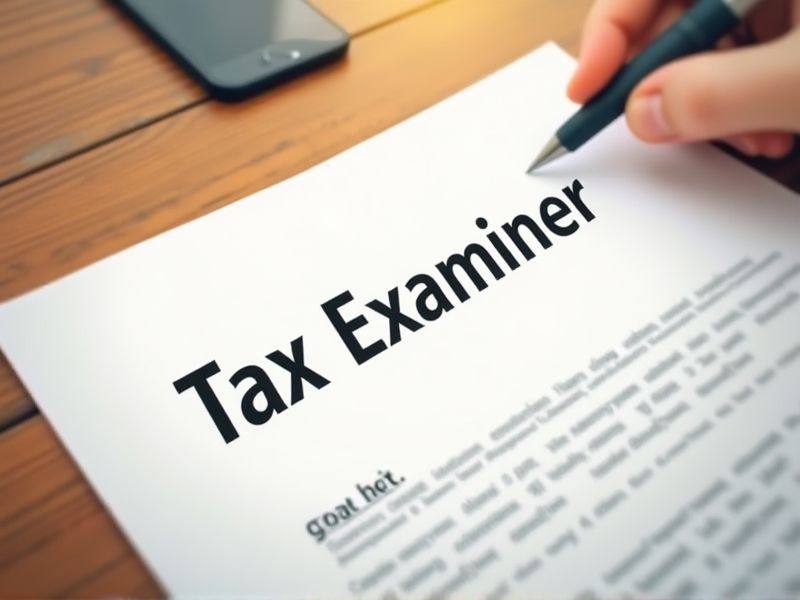
Tax Examiners require specific certifications to ensure they possess the technical expertise and legal knowledge necessary to analyze and verify tax returns effectively. Certifications validate a professional's understanding of tax codes, regulations, and auditing procedures, which are critical for maintaining compliance and accuracy. These credentials also enhance a tax examiner's credibility and trustworthiness in handling sensitive financial information. These are some notable certifications that could be essential for a Tax Examiner.
IRS Annual Filing Season Program Certificate
The IRS Annual Filing Season Program Certificate is necessary for tax examiners as it enhances their credibility and distinguishes them from uncredentialed preparers. Participation in the program requires completion of continuing education, which helps examiners stay informed on the latest tax laws and regulations. Holding the certificate can build trust with clients by demonstrating a commitment to a higher standard of tax preparation. Additionally, it may offer limited representation rights before the IRS, which is advantageous in resolving client issues.
Enrolled Agent (EA)
Enrolled Agents have expertise in tax law, which helps them accurately interpret and apply tax codes when examining returns. Their ability to represent taxpayers before the IRS reduces complications and ensures compliance during audits. Tax Examiners benefit from the EA's specialized knowledge, leading to more efficient and precise evaluations of tax documents. The presence of an EA minimizes errors, thereby decreasing the likelihood of disputes or amendments in tax assessments.
Certified Tax Preparer (CTP)
The expertise of a Certified Tax Preparer equips them with a deep understanding of ever-changing tax laws and regulations, crucial for a Tax Examiner to accurately enforce compliance. This expertise reduces the risk of errors during tax reviews, leading to more efficient processing and fewer discrepancies. Having a CTP ensures that all deductions and credits are accounted for correctly, which assists Tax Examiners in verifying the legitimacy of claims. Their proficiency in tax preparation supports Tax Examiners in identifying potential tax fraud, safeguarding the integrity of the tax system.
Certified Public Accountant (CPA)
Certified Public Accountants (CPAs) possess extensive knowledge of tax laws and regulations, which aids Tax Examiners in accurately evaluating tax returns. The rigorous training and examination process CPAs undergo equips them with skills to detect discrepancies and ensure compliance. Their expertise in financial analysis allows for thorough investigation of potential fraud or misreporting. CPAs bring credibility and professionalism to the tax examination process, enhancing public trust in tax administration services.
Tax Law Specialist Certification
Tax Law Specialist Certification provides tax examiners with comprehensive knowledge of tax codes and regulations, enhancing their capability to accurately assess tax returns. Expertise gained through certification enables examiners to identify potential discrepancies and fraud effectively. Certification equips tax professionals with the latest updates in tax laws, ensuring compliance and mitigating legal risk. Holding a recognized certification can elevate a tax examiner's professional credibility and career prospects within the field.
Certified Fraud Examiner (CFE)
Certified Fraud Examiners bring specialized skills in detecting and preventing fraud, which enhances the efficiency of tax examiners in identifying discrepancies. Their expertise in forensic accounting enables them to analyze complex financial data, improving the accuracy of tax assessments. With CFEs, tax examiners can better ensure compliance with tax laws, reducing the risk of revenue losses due to fraudulent activities. The presence of a CFE also bolsters public confidence in the tax system by safeguarding against tax evasion and misuse.
Accredited Tax Advisor (ATA)
An Accredited Tax Advisor (ATA) possesses specialized knowledge that can enhance a Tax Examiner's assessment of complex tax issues. With their expertise, tax errors are reduced, ensuring compliance and minimizing discrepancies. The ATA's insight aids in interpreting evolving tax regulations, thus preventing legal pitfalls. Engaging with an ATA can streamline processes, boosting the efficiency and accuracy of tax examinations.
Certified Financial Planner (CFP)
Certified Financial Planners (CFPs) possess a comprehensive understanding of financial strategies, assisting tax examiners in accurately interpreting complex financial data. Their knowledge of tax laws and regulations helps identify discrepancies or compliance issues effectively. CFPs can offer insights into potential tax planning strategies that tax examiners may recommend or scrutinize. Collaboration with a CFP enhances a tax examiner's ability to assess financial health and ensure taxpayers meet obligations.
Tax Compliance Specialist (TCS) Certification
Tax Compliance Specialist (TCS) Certification enhances the tax examiner's knowledge of complex tax laws, leading to more accurate and efficient evaluations. Employers often require certification to ensure tax examiners adhere to standardized procedures and regulations. This certification also increases credibility and trust in the tax examiner's professional judgment, aiding public confidence. Obtaining TCS Certification can lead to career advancement opportunities and potentially higher salaries.
Certified Internal Auditor (CIA)
A Certified Internal Auditor (CIA) provides expertise in evaluating and improving internal controls, which aids a tax examiner in identifying compliance issues. Their knowledge in risk assessment and management assists tax examiners in detecting potential areas of tax fraud and minimizing legal risks. CIAs offer a structured approach to auditing processes, ensuring efficiency and accuracy in tax examinations. Their proficiency in financial principles and ethical standards promotes integrity and trust in the overall tax assessment process.
Summary
When you gain certifications as a Tax Examiner, your expertise in tax laws expands, enhancing job performance and accuracy. Organizations may recognize your specialized skills, increasing potential for career advancement. Certifications can also bolster your professional credibility, potentially leading to higher salary opportunities. Employers often value certified professionals, which can result in better job security in a competitive field.
